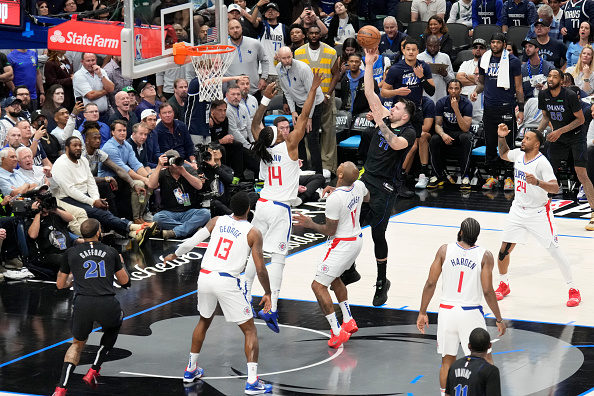Watching Scott Burrell explode for 23 points in the Bulls’ series-clinching win over New Jersey in Round 1 of the 1998 playoffs on NBC Sports Chicago reminded me of Jerry Krause’s fondness for bringing in veteran players to add to the championship mix.
Most of the players had minimal impact, but the Bulls’ general manager loved to tweak the bottom of the roster to see if he could find a player who could help win an important game or two along the way.
The Bulls first title team featured significant contributions from veterans Cliff Levingston and Craig Hodges, who had been starters on other teams earlier in their careers.
For the 1991-92 team, Krause brought in veteran shooting guard Bobby Hansen, who was nearing the end of a productive NBA career and had been a starter for the Utah Jazz. Hansen didn’t contribute much during the regular season, but he was part of the fourth quarter bench group that helped the Bulls erase a double-digit deficit in Game 6 of the Finals against Portland, which resulted in championship No. 2 and a wild on-court celebration at the old Chicago Stadium.
RELATED: Why Scott Burrell appreciated Michael Jordan's harsh leadership style
Krause rolled snake-eyes with his veteran pickups for the 1992-93 season. Shooting guard Trent Tucker and forward Rodney McCray contributed little to the title run, with McCray famously becoming one of Michael Jordan’s favorite targets in practice for not competing up to Jordan’s impossible standards. Chicago native Darrell Walker was signed late in that season and had some nice moments down the stretch.
Krause decided to experiment with big men during the second three-peat. Former Pistons Dennis Rodman, James Edwards and John Salley all came on board during the record 72-10 run in 1995-96.
NBA
Rodman worked out better than anyone could have predicted after a couple of stormy seasons in San Antonio. Despite the occasional on-court temper tantrum or off-court distraction, he fit in perfectly with Jordan and Scottie Pippen, handling the rebounding and low post defender duties which allowed the Bulls’ stars to thrive.
Edwards was pretty much finished as a player, while Salley contributed little after joining the team late in the season.
The next season, 1996-97, brought future Hall of Famer Robert Parish to Chicago. "The Chief" was done as a rotation player after giving his heart and soul to three championship teams in Boston, but he was a Krause favorite after the GM fell in love with the 7-foot center during his college days at Centenary.
The Bulls had much better luck in 1997 with their late-season addition of power forward Brian Williams. Williams didn’t join the team until April 2, but wound up being an important part of the playoff rotation. He posted five double-figure scoring performances off the bench that postseason.
Krause rolled the dice on another 7-footer for the Bulls’ last dance run in 1997-98. Joe Kleine was a former top 10 pick out of Arkansas and had a decent NBA career. But he rarely played behind Luc Longley and Bill Wennington. Kleine actually earned the nickname "Taco Joe" because he usually came in late in home games when the Bulls were trying to earn free tacos for the crowd at the United Center by reaching a certain point total.
And then there was Scott Burrell, who came over from Golden State in a trade for Dickey Simpkins in September 1997.
Burrell was a two-sport athlete in high school who was drafted twice by major league teams for his potential as a pitcher, with a fastball clocked in the 90s. He was the first American athlete to be drafted in the first round by two major professional leagues (MLB, Toronto Blue Jays; NBA, Charlotte Hornets).
Burrell played some minor league baseball in the summers while on a basketball scholarship at Connecticut, but eventually decided to go with hoops full-time and was picked No. 20 overall by Charlotte in the 1993 draft. His best NBA season came in 1994-95 when he averaged 11.5 points for the Hornets.
Krause hoped Burrell would provide some athleticism off the bench with the ability to play both forward spots, but as we learned in the first two episodes of "The Last Dance," he had a tough time winning Jordan’s respect.
Burrell was recently a guest on the "Bulls Talk Podcast" and talked openly about dealing with some tough criticism from Jordan, but he also had many fond memories of being a part of that final Bulls’ championship team.
After his 23-point explosion against the Nets, Burrell only had one more double-digit scoring performance in the 1998 playoffs, scoring 10 points and grabbing nine rebounds in a 42-point blowout of the Jazz in Game 3 of the Finals. He was cut in January 1999 following the extended NBA lockout and went on to play two seasons in New Jersey before finishing his NBA career back in Charlotte.
It will be interesting to see how many times Burrell is featured over the final eight episodes of "The Last Dance" documentary. He may have been a bit player in that last championship run, but we’ll be watching for those tense moments at practice and during games to see if Burrell finally earned the respect of the greatest player of all time.
Maybe he should have taken Jordan to Deerfield High School to see if Michael could hit his fastball.
Through May 15, NBC Sports Chicago is airing every 1998 Chicago Bulls NBA Playoff game (21 total). Find the full schedule here.
Click here to download the new MyTeams App by NBC Sports! Receive comprehensive coverage of your teams and stream the Bulls easily on your device.


